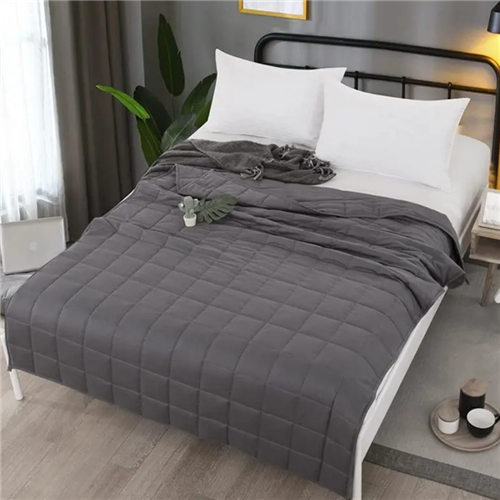Weighted blankets have grown in popularity in recent years, not only as a cozy addition to bedding, but as a potential tool for improving mental health. Filled with materials like glass beads or plastic pellets, these blankets are designed to provide gentle, even pressure on the body. This sensation is often referred to as “deep touch pressure” and has been linked to a variety of mental health benefits. But how exactly do weighted blankets change your mental health? Let’s delve into the science and testimonials behind this comforting innovation.
The science behind weighted blankets
Weighted blankets work through deep contact pressure (DTP), a form of tactile sensory input that has been shown to calm the nervous system. DTP is similar to the feeling of being hugged or hugged and can trigger the release of neurotransmitters such as serotonin and dopamine. These chemicals are known to improve mood and promote a sense of well-being. Additionally, DTP can reduce levels of cortisol (the stress hormone), thereby reducing anxiety and stress.
Reduce anxiety and stress
One of the most well-documented benefits of weighted blankets is their ability to reduce anxiety and stress. A study published in the Journal of Sleep Medicine and Disorders found that 63% of participants felt less anxious after using a weighted blanket. Gentle pressure can help stabilize the body, making it easier to relax and release anxious thoughts. For those who suffer from chronic anxiety or stress-related conditions, adding a weighted blanket to their daily routine can be a game-changer.
Improve sleep quality
Sleep and mental health are closely linked. Poor sleep can exacerbate mental health problems, while good sleep can significantly improve these problems. Weighted blankets have been shown to improve sleep quality by promoting relaxation and reducing nighttime awakenings. The DTP provided by the blanket can help regulate the body’s sleep-wake cycle, making it easier to fall asleep and stay asleep. For people who suffer from insomnia or other sleep disorders, this can lead to more restful nights and better overall mental health.
Relieve symptoms of depression
Depression is another area where a weighted blanket can make a huge difference. The release of serotonin and dopamine triggered by DTP helps elevate mood and combat feelings of sadness and hopelessness. While a weighted blanket is not a substitute for professional treatment, it can be a valuable complementary tool in managing depressive symptoms. Many users report feeling more grounded and less overwhelmed after adding a weighted blanket to their daily routine.
Supporting Autism and ADHD
Studies have also found that weighted blankets can be beneficial for people with autism spectrum disorder (ASD) and attention deficit hyperactivity disorder (ADHD). The calming effects of DTP help reduce sensory overload and improve focus and concentration. For children and adults with these conditions, a weighted blanket can provide a sense of security and stability, making it easier to cope with daily challenges.
Reflections on real life
The scientific evidence is compelling, but real-life testimonials add another layer of credibility to the benefits of weighted blankets. Many users have shared their positive experiences, noting improved sleep, reduced anxiety, and increased feelings of well-being. These personal stories highlight the transformative potential of weighted blankets for mental health.
In summary
Weighted blankets are more than just a trend; they’re a science-backed tool that can provide significant mental health benefits. From reducing anxiety and stress to improving sleep quality and alleviating symptoms of depression, the gentle pressure of a weighted blanket can make a difference. While they are not a panacea, they can be a valuable addition to a comprehensive mental health strategy. If you’re struggling with mental health issues, try a weighted blanket.
Post time: Sep-23-2024



